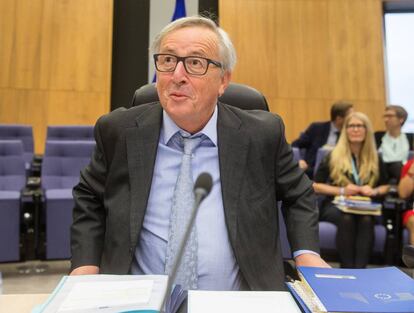Juncker: “If we allow Catalonia to separate, others will do the same”
European Commission chief says he has been pressuring Spanish PM to keep situation in check

European Commission President Jean-Claude Juncker on Friday expressed concern about the Catalan crisis in Spain, noting that a breakup could lead to further splintering across Europe.
“If we allow Catalonia – and it is not our business – to separate, others will do the same,” he said in a speech at Luxembourg University. “I do not want that. I wouldn’t like a European Union in 15 years that consists of some 98 states,” he said, alluding to the 98 major regions that the EU is composed of, according to Eurostat.
I wouldn’t like a European Union in 15 years that consists of some 98 states
EC chief Jean-Claude Juncker
“It’s already relatively difficult with 28 and with 27 not easier, but with 98 it would simply be impossible,” he added, illustrating the fact that barely half a dozen European countries can say that they lack any kind of territorial dispute within their borders.
Juncker insisted that the Catalan crisis remains an internal issue but also unveiled that he has been pressuring the conservative Spanish leader to take decisive steps to break the impasse.
“For days I have been asking (Prime Minister Mariano) Rajoy to take measures to ensure the situation does not get out of hand,” he said, in a veiled criticism of the conservative Popular Party (PP) government’s handling of the ongoing crisis. “Things have been done, but there is still much left to do.”
The EC chief also said that Brussels will not mediate in the dispute unless Rajoy asks for it
The EC chief also said that Brussels will not mediate in the dispute unless Rajoy specifically asks for it, as the Catalan government has already done. And the Spanish leader is ruling out that option, as it would entail some degree of recognition for the breakaway Catalan authorities.
Instead, the Spanish government has agreed to the opposition Socialists’s proposal to open up to the possibility of reforming the Constitution to find a better fit for Catalonia within Spain. In exchange, however, Catalan premier Carles Puigdemont must retract his plans for independence.
Next Monday at 10am marks the end of the five-day deadline which Madrid has given Puigdemont to clarify beyond any shadow of a doubt whether independence has already been declared in Catalonia or not.
This request follows Tuesday’s ambiguous parliamentary address by the regional premier, who declared independence then immediately placed it on hold, arguing that he is still open to talks with Madrid.
If the answer is yes, Catalan authorities will then have until Thursday to change their mind. After that, Rajoy has pledged to activate Article 155 of the Spanish Constitution, which grants the central government the right to temporarily intervene in a region’s internal affairs to force it to obey national legislation. The Socialists and the reform party Ciudadanos support this move, while Podemos does not.
Leaders of CUP, the small far-left party whose support is critical to Puigdemont’s minority government, on Friday urged the Catalan leader to go ahead and declare a Catalan republic.
“If [the central government] means to keep applying the provisions of Article 155 of the Spanish Constitution, let them do so with the republic already proclaimed,” reads the CUP’s letter to Puigdemont.
Mossos on a blacklist
If Article 155 is invoked, then very likely the Mossos d’Esquadra, the Catalan police force, will be one of the first regional agencies to feel the difference. In all likelihood, this law enforcement agency would come under the direct control of Spain’s Interior Ministry, as opposed to the Catalan government’s.
The Mossos’ role has been called into question after they failed to effectively stop the October 1 referendum from taking place despite a court order to do so. The agency’s leaders have been accused of a pro-independence bias.
The split caused in Catalan society over the issue of independence has reached the Mossos, some of whom have sent Interior Minister Juan Ignacio Zoido a letter denouncing internal pressure and saying that blacklists of “pro-Spain Mossos” are being drawn up.
“Many of us feel subjected to an abnormal control over our actions by our superiors and by other officers who have openly manifested their ideological position, something which is improper in a profession such as ours,” reads the letter.
English version by Susana Urra.
Tu suscripción se está usando en otro dispositivo
¿Quieres añadir otro usuario a tu suscripción?
Si continúas leyendo en este dispositivo, no se podrá leer en el otro.
FlechaTu suscripción se está usando en otro dispositivo y solo puedes acceder a EL PAÍS desde un dispositivo a la vez.
Si quieres compartir tu cuenta, cambia tu suscripción a la modalidad Premium, así podrás añadir otro usuario. Cada uno accederá con su propia cuenta de email, lo que os permitirá personalizar vuestra experiencia en EL PAÍS.
¿Tienes una suscripción de empresa? Accede aquí para contratar más cuentas.
En el caso de no saber quién está usando tu cuenta, te recomendamos cambiar tu contraseña aquí.
Si decides continuar compartiendo tu cuenta, este mensaje se mostrará en tu dispositivo y en el de la otra persona que está usando tu cuenta de forma indefinida, afectando a tu experiencia de lectura. Puedes consultar aquí los términos y condiciones de la suscripción digital.








































